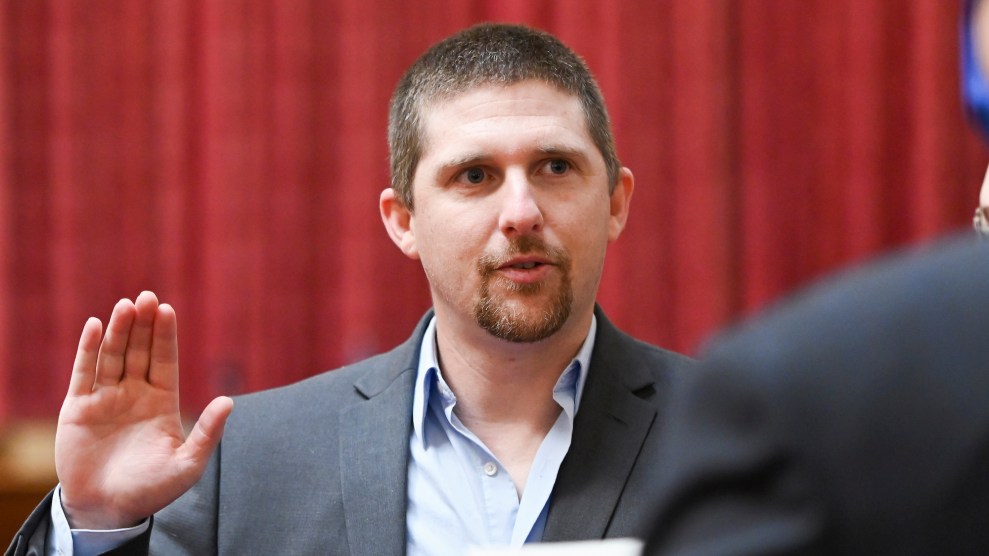
Derrick Evans raises his hand during a swearing-in ceremony to the West Virginia House of Delegates on Dec. 1, 2020, in Charleston, W.Va. Will Price/West Virginia Legislative Photography via AP
West Virginia voters had an unenviable choice of congressional candidates in the GOP primary Tuesday: a guy who stormed the Capitol on January 6, or an incumbent who, after having to evacuate the Capitol during the riot, went back to vote against certifying the election. Voters chose the incumbent.
Rep. Carol Miller trounced “J6 prisoner” Derrick Evans by almost 30 points, in the race to represent West Virginia’s first district. She will likely win the general election in November. The campaign has been viewed as something of a litmus test of how voters view the January 6 insurrection three years later.
Evans had just been elected to the state legislature when he livestreamed himself breaching the US Capitol along with the angry mob. He announced his candidacy for Congress soon after leaving prison, where he had served a 90-day sentence after pleading guilty to a felony for obstructing law enforcement during civil disorder. He made his January 6 conviction a centerpiece of his energetic campaign. He was endorsed by the House Freedom Caucus chairman Rep. Bob Good (R-VA), and former Trump National Security Adviser Michael Flynn appeared with him in Charleston last week, saying, “I want people of high moral character, people who are incorruptible, who are willing to lead our country forward against this tyrannical overreaching political establishment that we have.”
Miller mostly ignored Evans throughout his long campaign. She refused to debate him this weekend, leaving Evans to talk to an empty chair. And when USA Today recently asked Miller what she thought about whether he should be on the ballot given his felony conviction, she replied, “I don’t think about him at all.”
Carol Miller (WV) refused to show up to the debate tonight. With her voting record, I don’t blame her. pic.twitter.com/Mdv9vwRBM1
— Derrick Evans (@DerrickEvans4WV) May 12, 2024
But in the past month, as his campaign gained traction, she clearly started to think about him a little more. In early April, for the first time, campaign finance records show she spent $40,000 on polling. During the last quarter, her fundraising shot up by $370,000, fueled by lots of donations not from West Virginia voters but from inside the Beltway lobbyists happy to ante up for a member of the powerful House Ways and Means committee.
On April 11, Miller’s campaign spent $313,580 on an ad buy, the first she’d done since kicking off her reelection campaign. Until then, her largest expenditures had been donations to the National Republican Campaign Committee and $36,000 for an event last year during the LIV golf tournament at the Greenbrier Resort in West Virginia.
Despite having abundant material with which to attack Evans—whose felony conviction prevents him from voting until he’s completed three years of probation—Miller’s ads targeted Evans for having once been a Democrat. It looked like pretty weak sauce in a state where the current governor, Jim Justice, who just won the GOP primary to fill the seat of retiring Democrat Sen. Joe Manchin, also used to be a Democrat.
But the ads reflected the fine line Miller had to walk in trying to campaign against a January 6 rioter and MAGA die-hard in a state where, as Evans’ campaign consultant Noel Fritsch, told me recently, “Eighty percent of the voting electorate thinks that whatever happened on January 6 was warranted and 70 percent think the Feds did it.” (Polls back him up on some of this.)
Democracy advocates had argued that Evans should not even have been allowed on the ballot to begin with because the Constitution bars former elected officials who participated in an insurrection from holding federal office. An Evans victory would have put Congress in the very awkward position of having to decide whether to enforce the Constitution or respect the will of West Virginia voters. As I wrote recently:
Section 3 of the 14th Amendment, a Reconstruction-era provision, prohibits anyone who took an oath to uphold the Constitution, such as state legislators like Evans, from serving in federal office if they “engaged in insurrection.” Donald Sherman, executive director of Citizens for Responsibility and Ethics in Washington (CREW), says the state should not have allowed Evans on the ballot at all, but no one filed a legal challenge. “I think he didn’t look like a contender a year ago when he announced,” Sherman said. “He might have flown under the radar for some folks.”
Now, only Congress can decide whether Evans could join their ranks, thanks to the March US Supreme Court decision in Trump v. Anderson, which held that Colorado could not take Trump off the ballot because of his involvement in January 6. The court said that the states cannot enforce Section 3 against federal candidates; only Congress can. “There are not that many people with a stronger case for disqualification under Section 3 than Mr. Evans,” Sherman said. “I think ultimately if he prevails it will come down to whether Congress will enforce the provision of the Constitution against an insurrectionist.”
Most political observers thought it would have been highly unlikely that Congress would have tried to prevent Evans from taking his seat if he’d won. Miller’s victory leaves that hypothetical untested. She issued a bland statement after the race was called Tuesday night that reflected her anodyne campaign and her intention to continue ignoring her opponent, whom she didn’t mention.
“It has been the honor of my life to represent West Virginia in Congress, and I am grateful to have won the Republican primary in West Virginia’s First Congressional District tonight. Over the past few years, I have ensured that the Mountain Valley Pipeline will be completed, worked on legislation that will lower taxes for West Virginians, and held the Biden Administration accountable,” Miller said. “While the Republican House Majority has accomplished great work, we still have more to deliver for the American people. I’m thankful to represent my wild and wonderful state in Washington, and I will continue to work to make West Virginia the best place to live, work, and raise a family.”
Evans waited until Wednesday morning to publicly concede the race. “The sun came up, God is still good, & I’m blessed with a beautiful & healthy family,” he tweeted. “Congrats to Carol on the win. I hope you realize 38k people in your district do not feel represented by you, & you start to vote more conservative. To the swamp. We are still coming for you.”
May 15: This story has been updated to include Evans’ concession.
















